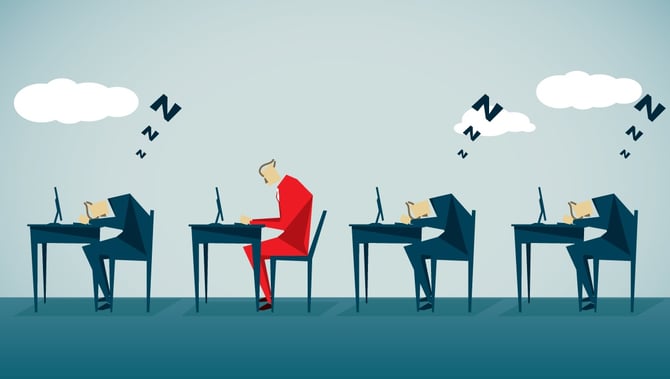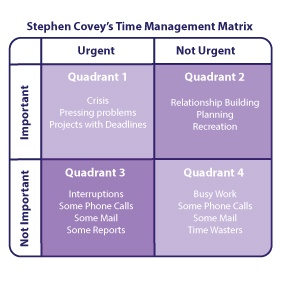
Let’s face it, there are only really three ways that you can get more done at work: work longer, work harder or work smarter. Our preference is for the latter, which requires being thoughtful about how you manage your energy, as well as how you manage your time. To help you save some of both, we’ve done the hard work for you: here’s our guide to the smartest ways to reach peak productivity and efficiency at work.
Become a morning person
As part of our events series at National College of Ireland we’ve been lucky enough to welcome and learn from some of the most successful people in the country. They all had one thing in common: they got up early, and had a morning routine, whether that was catching up on current affairs over breakfast, or fitting in a workout. Following their lead will strengthen your willpower and help you to feel more in control, not to mention more awake and productive by the time you reach your desk. Not a morning person? Start with small steps: get up 5 minutes earlier tomorrow and gradually increase this over time.
Give yourself a pep talk
Stop rolling your eyes, this one’s backed up by science! Most of us are too hard on ourselves, but positive self-talk can actually boost confidence, motivation and cognitive abilities, according to recent psychological research.
Picture a situation where you’re feeling overwhelmed at work because you have so much to do. Imagine how you’ll feel if you tell yourself: “I’m so stressed,” or “I can’t cope”; not very helpful, is it?
Imagine how you’ll feel if instead, you think: “You’re going to achieve x and y today. What do you need to prioritise to get it done?” Focus instead on how you can change the immediate situation, and things might feel a little brighter. Oh, and whatever you say, make sure it’s in the second person: according to the research, "You can do it!" beats "I can do it!" every time.
Work with your natural rhythms
Back in the 50s, researchers discovered the “basic rest-activity cycle”, where we move from high to low alertness in 90 minute cycles. Recent research has built on this, suggesting humans are at our most productive when we work in 90 minute spurts, before taking a break.
And while it sounds counter-intuitive, breaks are an important part of the productivity cycle, helping to clear the mind and restore focus; conversely, working without a break can lead to poorer performance. Besides, sitting at your desk all day is bad for your health.
You can be more productive when you organise your day around your energy levels, too: take on the trickiest tasks first, when your energy is at its highest, and save the more routine stuff – like catching up on emails or replying to voicemails - for when you’re flagging.
Prioritise your to-do list
The humble to-do list can be a powerful productivity tool – but only when you utilise it effectively. Writing out all the tasks you must complete can help you feel more organised – but it could also make you feel confused and overwhelmed, if the list is too long.
 In order to prioritise your list, and organise it into several shorter lists, we like the Time Management Grid suggested by Stephen Covey in the 7 Habits of Highly Effective People (that's it above). This helps you sort tasks into four groups:
In order to prioritise your list, and organise it into several shorter lists, we like the Time Management Grid suggested by Stephen Covey in the 7 Habits of Highly Effective People (that's it above). This helps you sort tasks into four groups:
- 1. Urgent and Important
- 2. Not Urgent and Important
- 3. Urgent but not important
- 4. Not urgent and not important
According to Covey, successful people prioritise the tasks in quadrant 2 more than the majority of others. These are the things that matter to our long-term success, but can be put off because they’re not time sensitive. Learn to prioritise these things more than the tasks in quadrants 3 and 4, which aren't as deserving of your attention.
Forget multi tasking – try batching tasks together instead
Switching from one task to something completely different is something our brains just aren’t very good at. We’re more productive when we focus on one specific task to the best of our ability.
And when it comes to smaller, lower intensity tasks, we’re more productive again when we batch jobs together; it cuts down on the time it takes to switch between projects, and allows us to get into a flow. So boost your productivity by returning emails or phone calls in one batch, reading industry articles and newsletters at designated times or scheduling your daily social media messages in one sitting.
Be proactive, not reactive
Don’t allow incoming emails, phone calls, queries from colleagues and meeting requests to set the schedule for your day. This is the quickest route to feeling frazzled and neglecting your own priorities and goals.
Minimise distractions wherever you can: consider setting office hours, closing your door or even working from home when you really need to focus on a task. You can also use your time outside of work in a more proactive way: prep for each day the night before, outsource personal chores if you can afford it and use your commute to listen to industry podcasts or TED talks.
Finish the week on a high
Carving out some time on a Friday to reflect on the previous week and plan for the week ahead is one of the most effective time management habits you can develop. We've got a whole blog post on how to do that here.
Originally written in September 2016, updated in February 2021.










